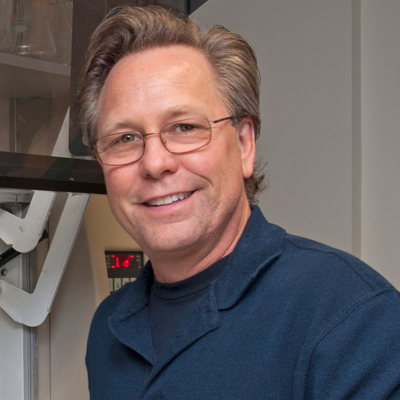Dr. Shadel studies the unique aspects of mitochondria that affect aging and disease processes
The U.S. Department of Health has projected that by 2030, people that are 65 years and older will represent 19% of the population. Healthcare providers and scientists have begun to recognize the immense challenges that an aging population creates, especially those concerning quality of life. Dr. Gerald Shadel, of Yale School of Medicine, directs his research towards understanding how mitochondria are involved in human disease and aging. As major sites of energy metabolism, mitochondria are commonly known as the "powerhouses of the cell." However, mitochondria are complex and dynamic cellular structures that do much more than just make energy for cells. For example, they can also determine if a cell lives or dies, help mount responses to stress, and help combat infections by triggering anti-viral and anti-bacterial responses. In addition, they house the essential mitochondrial genome (or mtDNA) that is inherited from your mother and can cause inherited diseases. Finally, they are major players in the aging process and common diseases such as Parkinson's disease, diabetes and cancer, and can have either beneficial or deleterious effects on health and longevity. By understanding how mitochondria work, Dr. Shadel hopes to protect or improve their function to combat many diseases associated with mitochondrial dysfunction and perhaps intervene in the aging process to allow humans to live healthier lives.
Dr. Shadel's research presents an entirely new approach to mitochondria's impact upon aging and disease. Therefore, he hopes to augment mitochondria in a way that researchers will improve the healthspan for individuals of all ages. Dr. Shadel's research has expansive ramifications for our society and economy as our population grows older and age-related diseases such as cancer, neurodegeneration and diabetes increase in prevalence and become an increasing burden on our healthcare system. In short, the role of mitochondria in human disease and aging is grossly underestimated and understudied, however it holds the promise for many disease treatments and living healthier lives as we age!
Current research includes:
-
Lengthening Healthspan: Dr. Shadel's research has found that when mitochondria are stressed, lifespan can be lengthened. His research is therefore directed toward investigating ways to improve quality of life and health as our population ages. This includes efforts to understand the mechanism of expression of genes encoded by mtDNA, elucidating signaling pathways that control mitochondrial function and respond to cellular stress, and generating/exploiting yeast, cell culture and animal models of how mitochondria are involved in aging and disease pathology.
-
Immune System: Mitochondria derive from bacteria and therefore can have immune stimulatory effects. For this reason, mitochondria have been shown to cause inflammation, which is a big contributor to many diseases including aging diseases. Dr. Shadel has shown that mitochondrial stress activates the immune system in order to defend against pathogens, but that this may also promote disease processes.
-
Disease and Aging Process: Dr. Shadel's research hopes to find potential treatments for age-related hearing loss, cancer, ataxia-telangiectasia, and mitochondrial diseases. His previous research has had great success in understanding the ways in which treatments and preventative measures can be crafted for various diseases.
Bio
Gerald S. Shadel received a B.S. from the University of Nevada, Las Vegas in 1986 and his Ph.D. from Texas A&M University in 1991. He went on to Stanford University, where he was a Damon-Runyon postdoctoral fellow and studied the mechanism of mitochondrial gene expression. As an Assistant/Associate Professor of Biochemistry at Emory University from 1997-2004, he continued research in this area using biochemical methods and yeast and tissue culture models. He is currently a Professor of Pathology and Genetics at Yale University, where he studies the role of mitochondria in human disease and aging, now also using mouse models. In 2007, Dr. Shadel received the Amgen Outstanding Investigator Award from ASIP recognizing his contributions in this important area of research and medicine.
Dr. Shadel's interest in science began early. His parents grew up in Los Alamos New Mexico, which is home of the National Lab where many great scientific breakthroughs were made and his grandparents worked at "The Lab," but were not scientists. Dr. Shadel remembers visiting often and was always intrigued by the lab and the science museum associated with it. Dr. Shadel's love of science was further fostered at UNLV, where he majored in Chemistry and worked in an Environmental Protection Agency lab. This experience gave him great latitude to learn many types of lab techniques and from there on he was hooked. Near the end of his undergraduate degree, he heard about genetic engineering and recombinant DNA and knew that was the future and became excited to work in this area! As a professor and mentor, Dr. Shadel is committed to the advancement of future scientists. Over the last 16 years, he has supervised nine Ph.D. students, ten postdoctoral associates, and more than 25 undergraduate researchers, many of whom have been awarded fellowships and gone on to successful independent careers in academics, government, or the private sector. In his free time, Dr. Shadel enjoys the outdoors, fly fishing or a nice game of darts.
Website: http://medicine.yale.edu/lab/shadel/
In the News
Publications
Videos
Awards
Amgen Outstanding Investigator Award, 2007
American Society for Investigative Pathology
Breakthroughs in Gerontology (BIG) Award, 2007
Glenn Foundation for Medical Research and American Federation for Aging Research
Glenn Award for Research in Biological Mechanisms of Aging, 2011
Glenn Foundation


